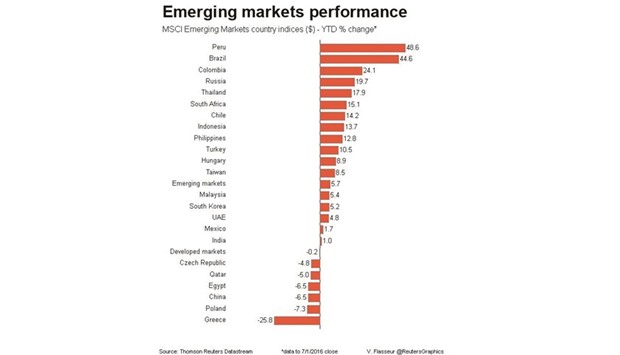Emerging market stocks hit a two-month high yesterday, extending last week’s post-Brexit gains but Poland’s latest pension overhaul proposal knocked its shares and weighed on currencies across the region.
MSCI’s emerging market benchmark rose 0.5% in it fifth straight day of gains, lifted by solid gains across Asia as well as in Russia, Turkey and South Africa.
Yet the index provider’s eastern European benchmark struggled to make any gains.
Poland’s stock exchange tumbled nearly 3% at the opening after the government said it would transfer state-guaranteed private pension funds, known as OFEs, into mutual investment funds and a state-run demographic reserve fund.
The market touched a 10-day low. “That comes in a time of further strain on the expectations of budget realisations, as Polish growth gets revised down and the country continues to struggle with shocks with the EU,” said Luis Costa, head of CEEMEA FX and debt strategy at Citi.” Markets want to know what will happen to the equity allocation at the OFEs, how it will be transferred and whether it will be sold,” Costa wrote in a note to clients, adding he expected this to be an equity-focused event for now.
Bourses across emerging Europe followed Warsaw’s lead, with stocks in Bucharest down almost 1%, while Budapest and Prague slipped around 0.2%.
Currencies in the region fared little better with the zloty weakening 0.5% versus the euro while the forint and the leu also lost ground.
Elsewhere, China’s yuan touched a new 5-1/2 year low against the dollar for the second consecutive session amid concerns that the central bank would tolerate a further weakening of the currency.
In Turkey, the lira was unchanged after inflation rose at a faster-than-expected pace in June thanks to a rebound in food inflation, but the upside surprise was not seen changing expectations of further monetary policy easing.”
Recent falls in the headline rate were unsustainable,” William Jackson, Senior Emerging Markets Economist at Capital Economics wrote in a research note.”
The central bank might still use last month’s modest fall in core inflation as justification for lowering interest rates a little further — particularly given government pressure to do so — but it’s clear that the easing cycle is nearing an end.” Israel’s shekel slipped 0.2% against the dollar as dealers said the central bank bought “hundreds of millions” of dollars worth of foreign currency to curb gains on its currency which has strengthened 0.8% since the start of the year.

EME
